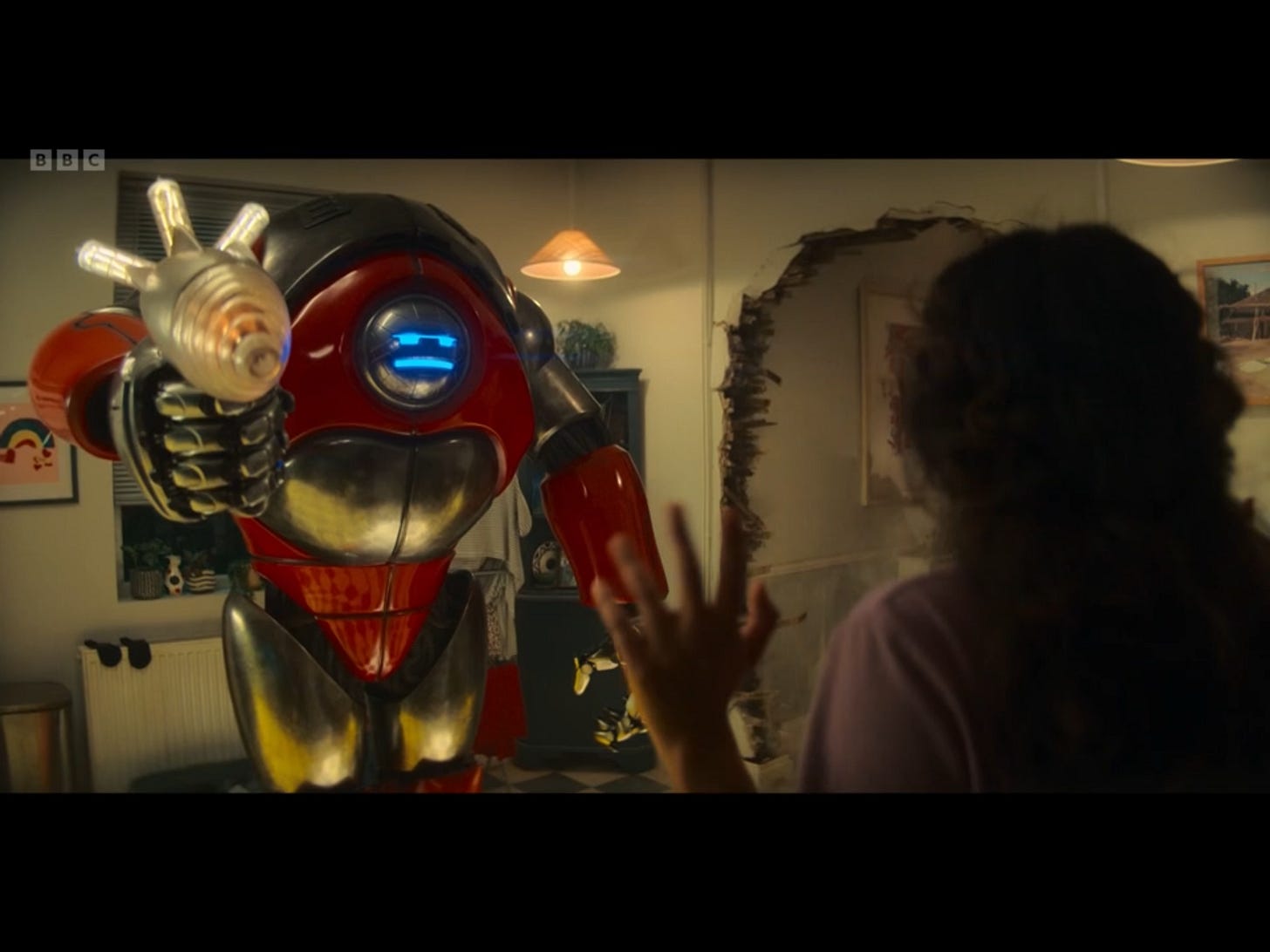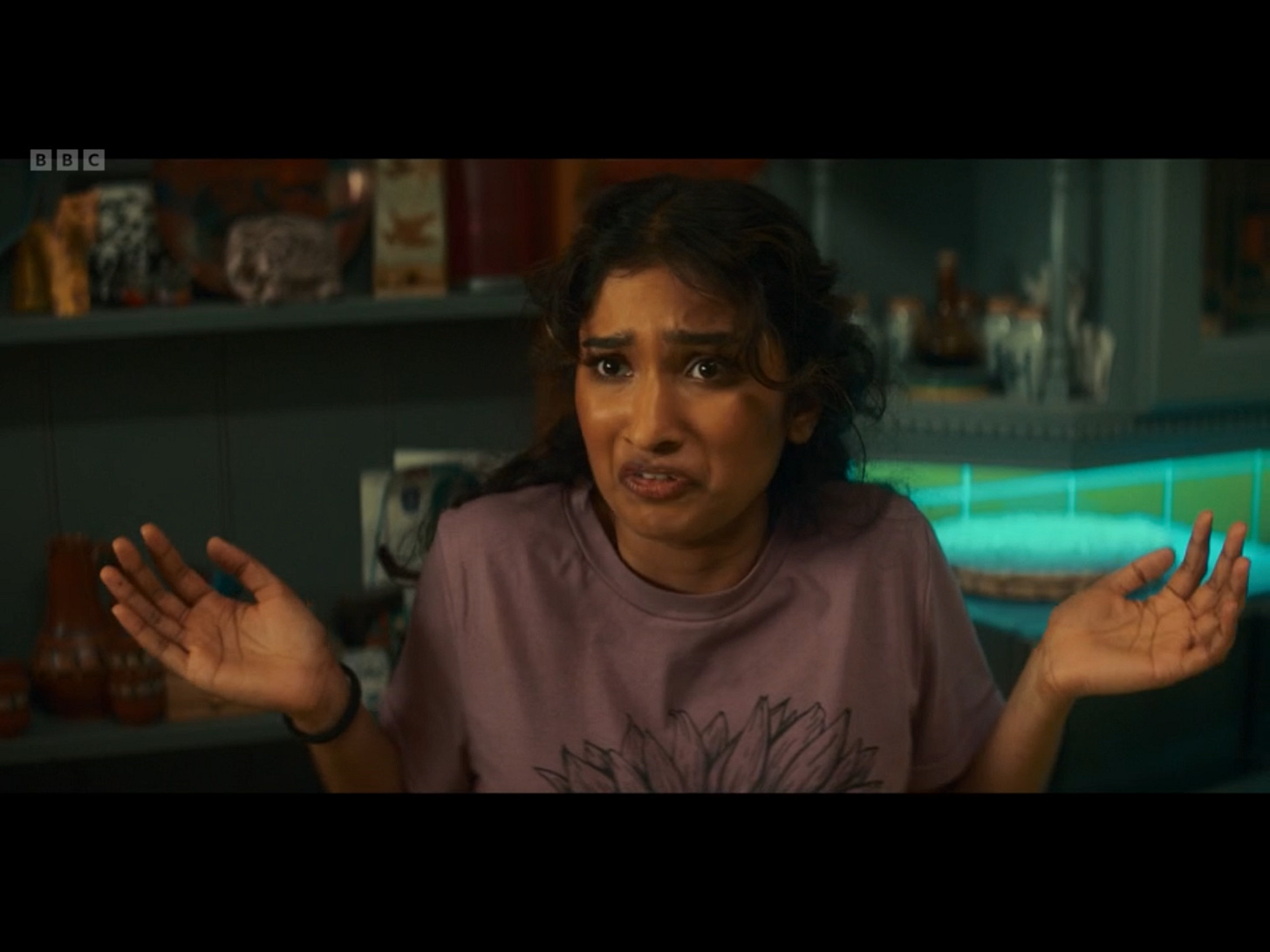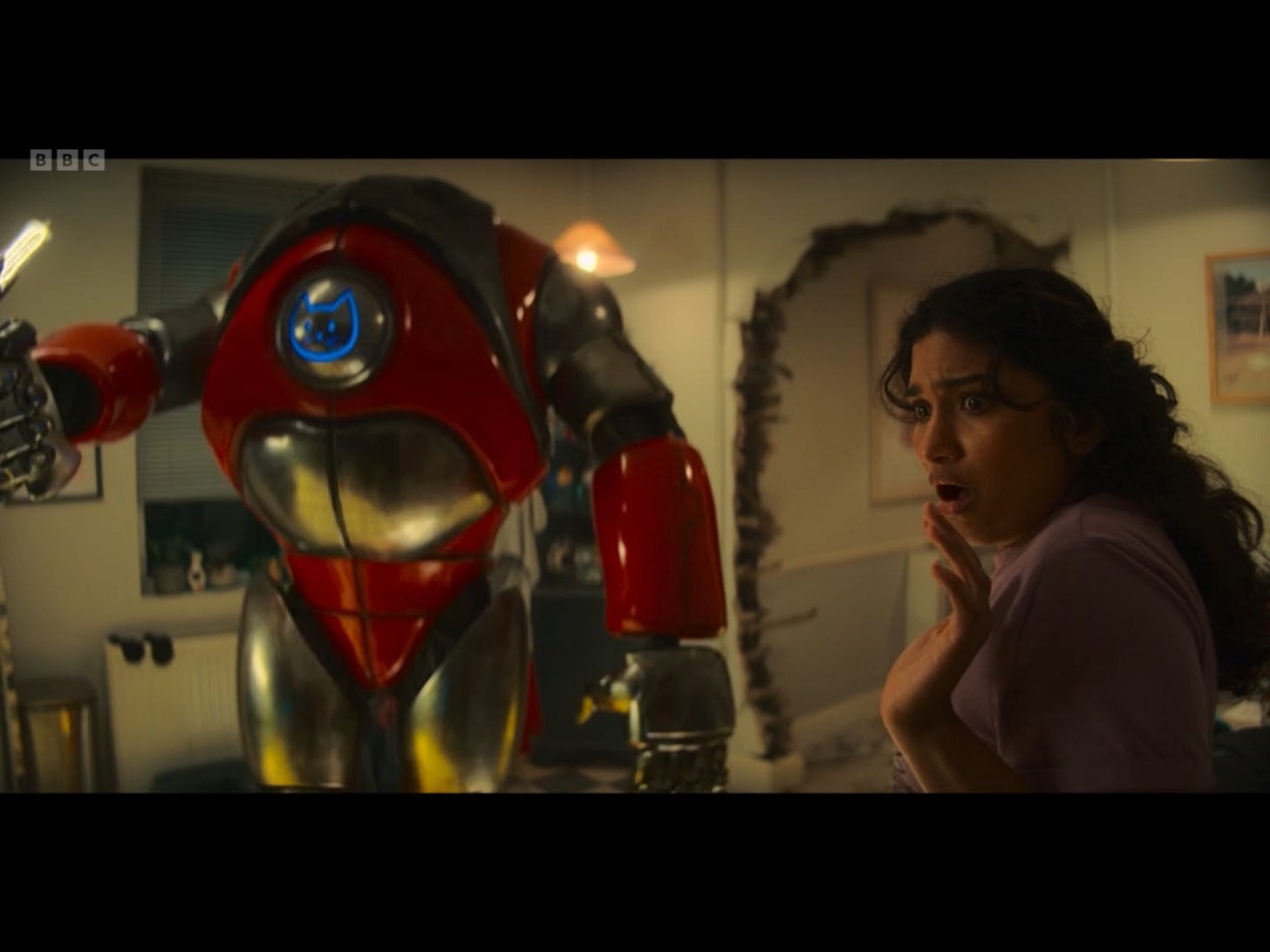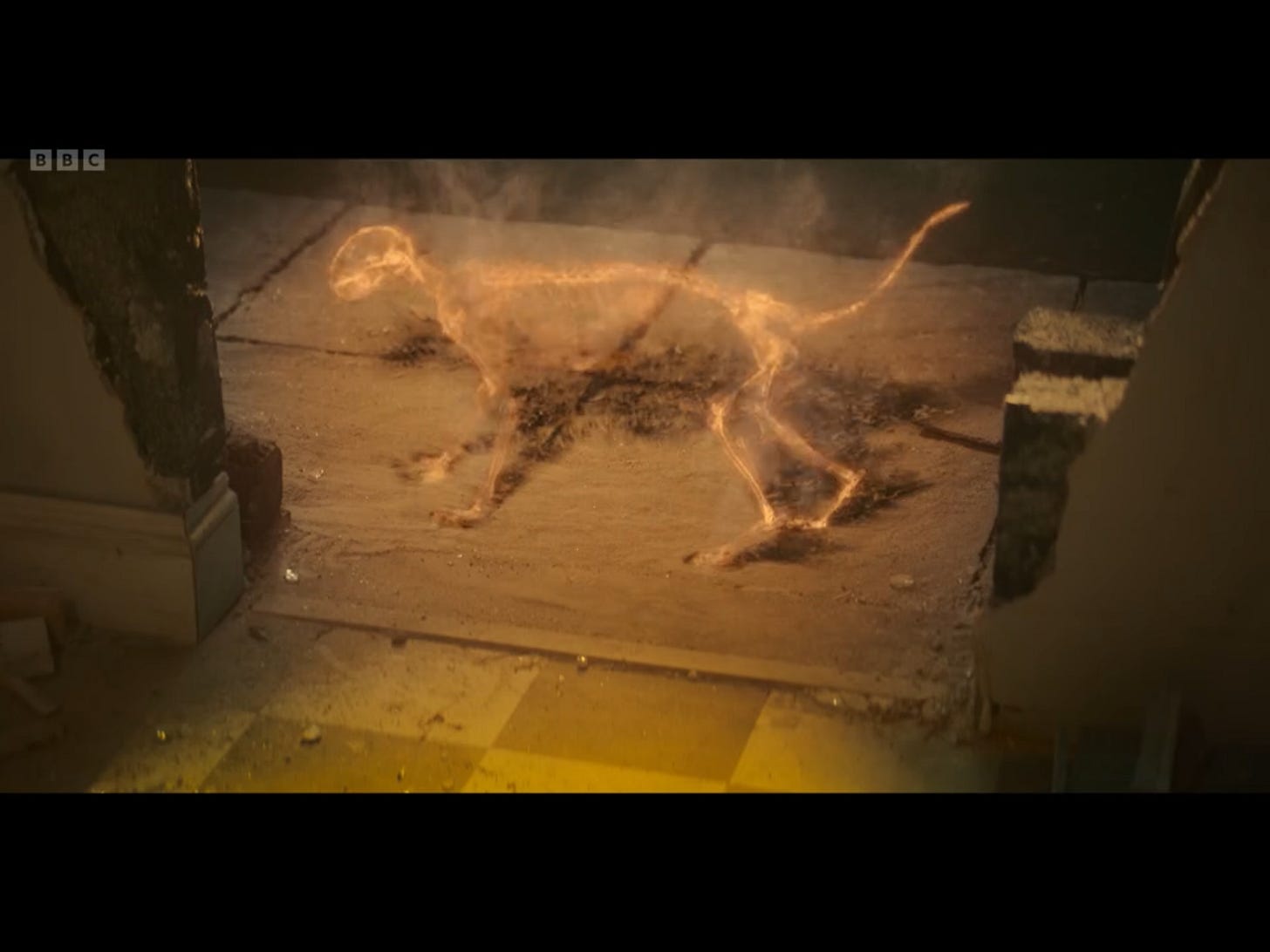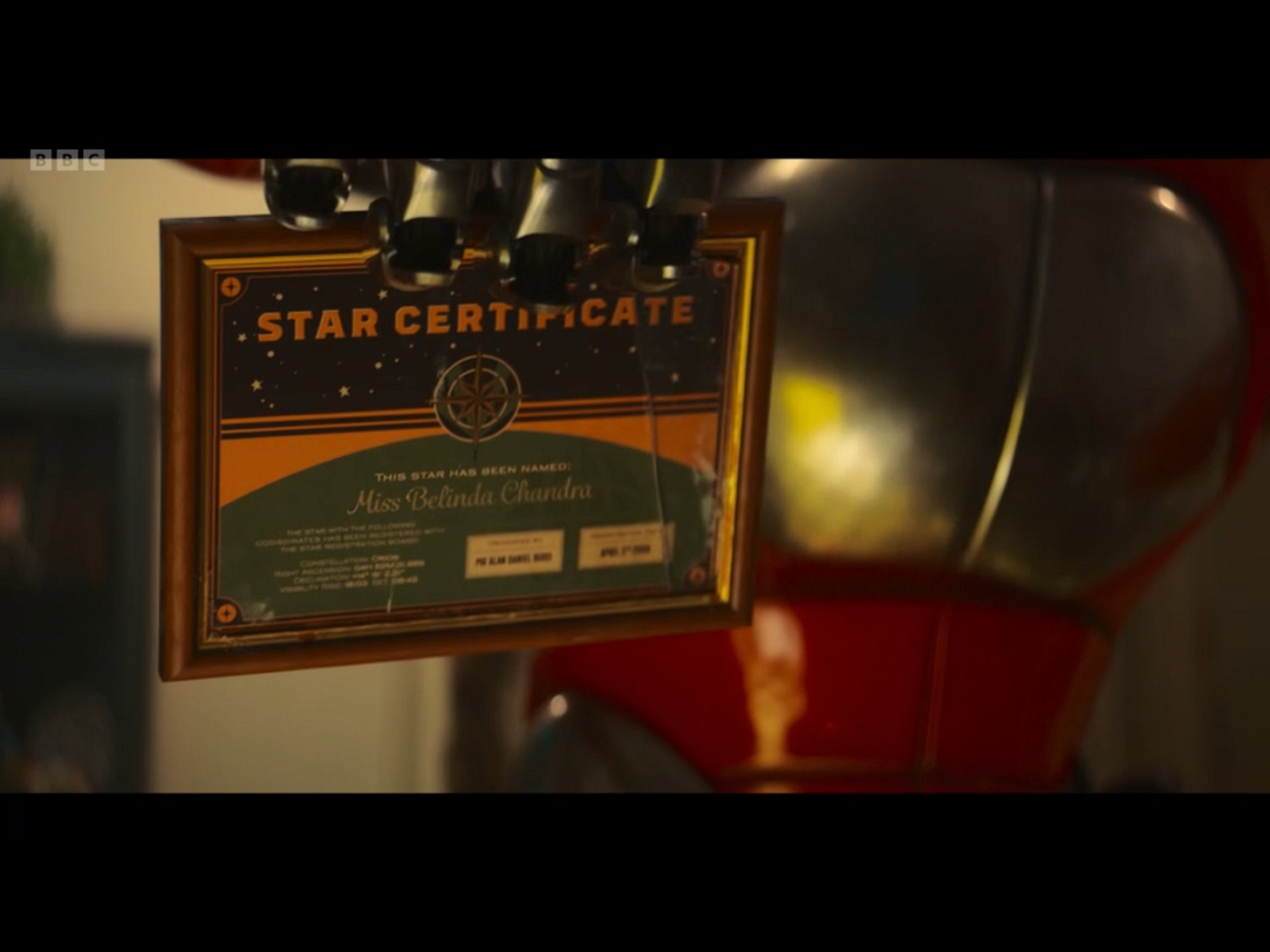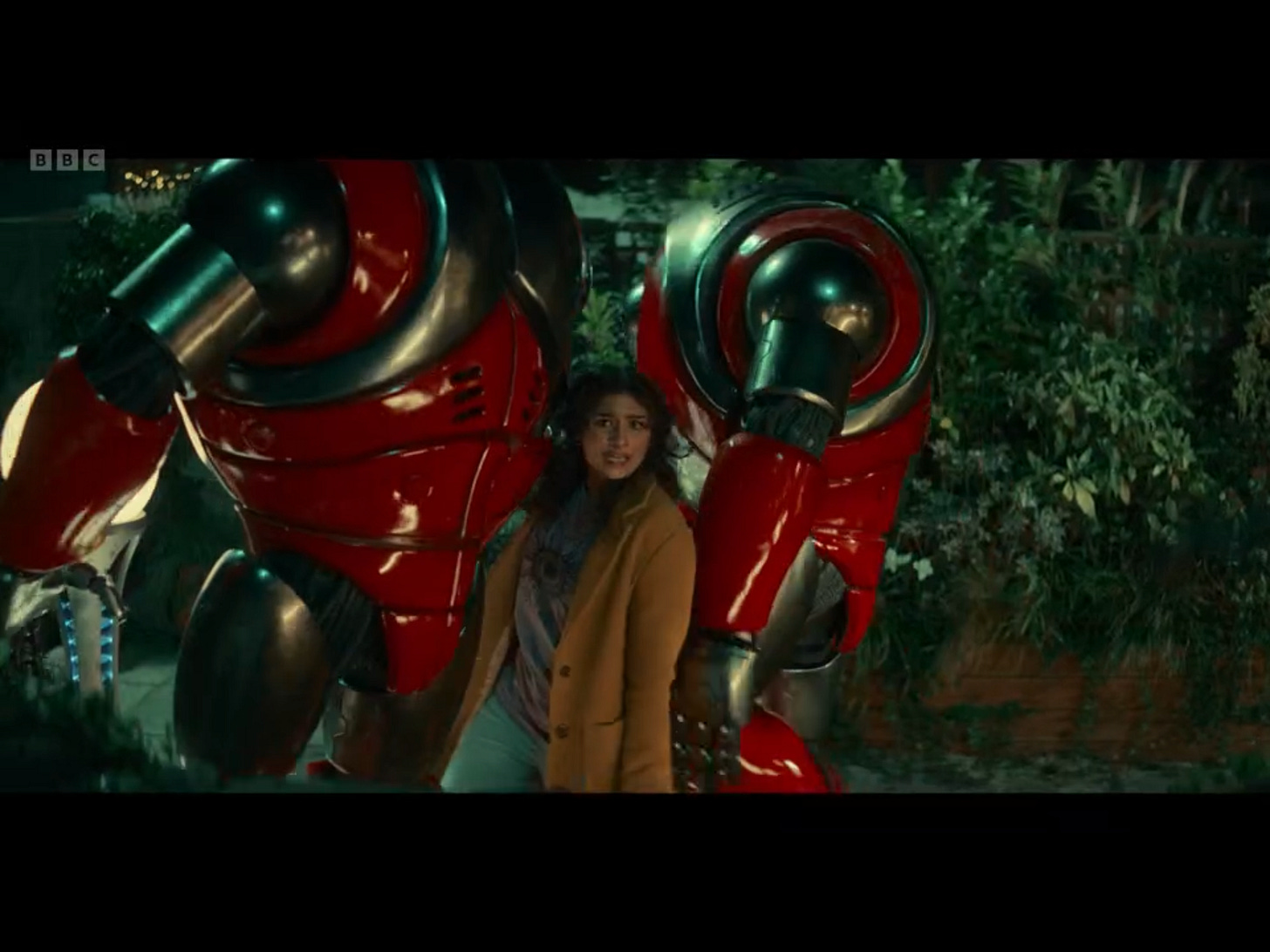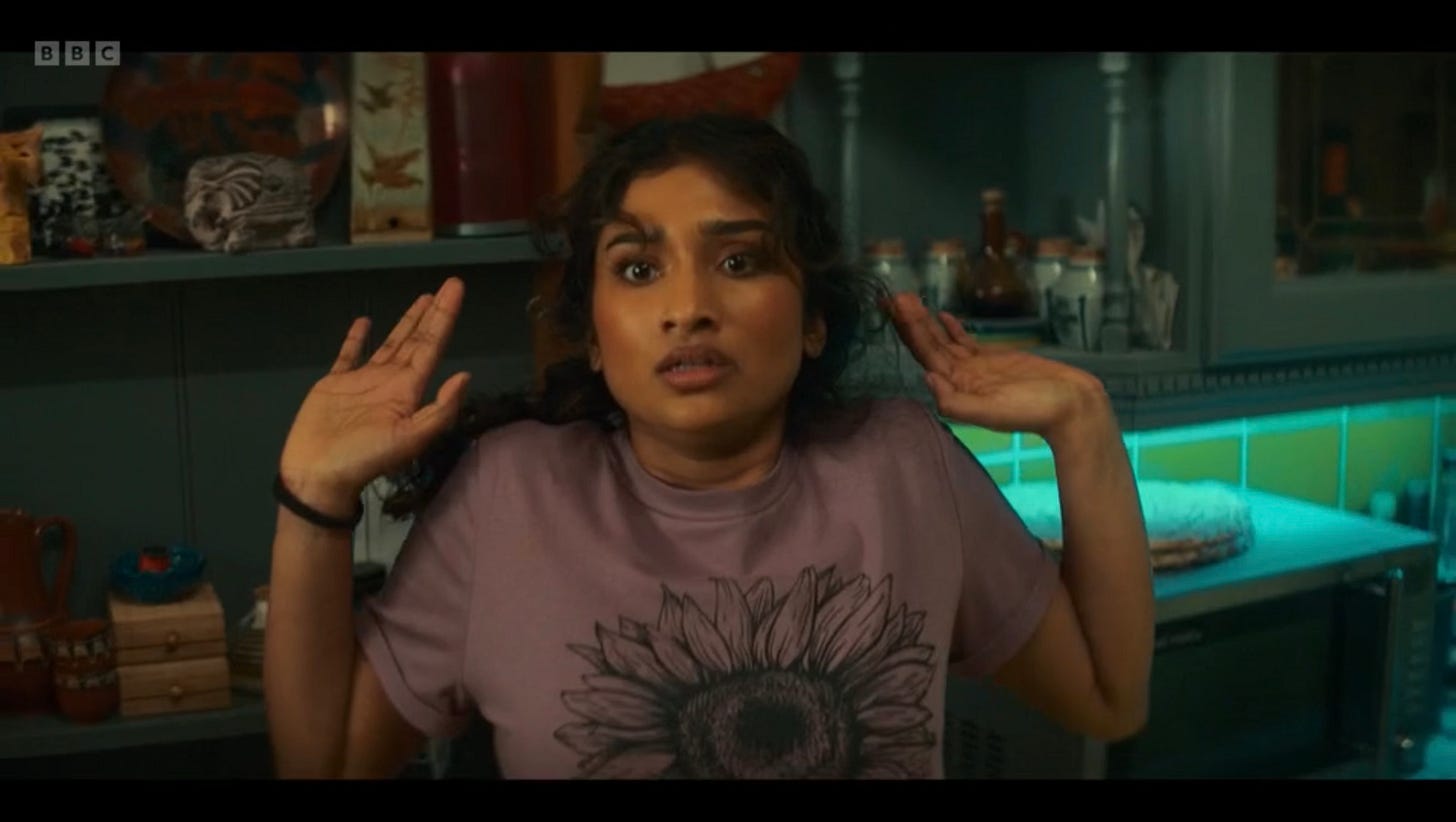it wasn’t my cat! (and other dialogue secrets from doctor who)
What writers can learn from robots, queens, and tragically irrelevant cats
Ever struggle to make dialogue sound natural while advancing plot, revealing character, and maybe even landing a joke, all in just a few lines? In this new feature, DOCTOR DIALOGUE, we'll dissect small moments from Doctor Who to find big writing lessons applicable anywhere.
Don't watch Doctor Who? No problem – I’ll provide all the context needed.
The focus is on transferable techniques, and while I'll mark heavy spoilers for recent episodes if needed, we'll generally stick to exchanges that reveal craft without giving away the ends of storylines.
For our first deep dive: a scene near the start of the very first episode of the new season, 'Robot Revolution'.
[ROBOT REVOLUTION, S02E01, 2025 — MINIMAL SPOILERS AHEAD — our scene takes place from approximately 04:00 to 06:00, and I don’t discuss the rest of the episode, so this is just from the start!]
The setup: Belinda — a nurse from Earth — is abducted by robots from another world to force her to become their queen…
ROBOTS
Missbelindachandra?
BELINDA
What?
ROBOTS
You are Missbelindachandra?
BELINDA
How do you know my name?
ROBOTS
Name confirmed… Your Majesty.
Right away, considering the zany situation, observe how simple, straightforward, and effective Belinda’s lines are: ‘What?’, ‘How do you know my name?’ It's tempting for writers to overwrite moments like this, stuffing them with extra drama and hesitation and revelation of character, but there’s no need yet. Restraint here serves the scene far better, keeping the focus squarely on the more immediate subject of interest: the robots and their arrival.
The robots, meanwhile, communicate not only their intentions but their nature as non-humans through the hilarious off-kilter eliding of Belinda Chandra’s entire name as ‘missbelindachandra’.
Including the 'Miss' feels oddly formal and robotic. The phrase being used repeatedly builds as a patterned rule of behaviour, that becomes funnier each time. There’s a cliche – ‘comedy comes in threes’ – that I think is true of most forms of writing, where the ‘rule of three’ is generally very effective in building all kinds of patterns (in rhetoric, we call it ‘tricolon’).
So – two repetitions of ‘missbelindachandra’, then, on the third beat, when we expect the name repeated in an actual line beginning ‘name confirmed’, we get an incredibly unexpected opposite-end-of-the-spectrum moniker: “Your Majesty.” We’ve gone from missbelindachandra, an ordinary name with a slightly infantilising title, to the absurdity of royalty. Conflict, comedy, and exposition delivered economically.
(Continued from:
ROBOTS
Name confirmed… Your Majesty.)
BELINDA
Your what now?
ROBOTS
You will come with us.
BELINDA
What if I don't?
(ROBOTS disintegrate a cat that’s passing by the house, visible via the open front door. The cat yowls, Belinda gasps)
BELINDA
You killed the cat!
ROBOTS
The cat is irrelevant.
BELINDA
It wasn’t my cat!
ROBOTS
The cat is still irrelevant.
Belinda's responses shift beautifully here, from understandable reactive questions ("Your what now?") to implying resistance ("What if I don't?"), then to expressing genuine outrage ("You killed the cat!"). This arc feels psychologically true, grounding the scene even as the absurdity peaks with her next line: "It wasn’t my cat!" It's both a relatable deflection under pressure and hilariously beside the point for the robots, showcasing Belinda's flustered state while allowing us to build our sense of who she is.
The cat’s swift demise serves multiple functions. It's shockingly abrupt, demonstrating the robots' ruthless efficiency and raising the stakes instantly. It also cleverly plays with common screenwriting principles. While it subverts the literally named "Save the Cat!" principle (show a character doing something nice early to get the audience liking them), the outrage it provokes in Belinda achieves a similar effect – we see her immediate empathy, establishing her as non-pro-killing-cats.
It also fulfils what I call ‘Chekhov’s bomb” (the idea that if you threaten an exciting event, it should happen somehow, even if it’s just a test demonstration).
Here, the implied threat behind "You will come with us" gets an immediate, albeit unexpected, payoff) This likely plays havoc with our subconscious recognition of these principles, showing the robots mean business.
Belinda's role here is key. The main thing that can be hard for writers to grasp – especially talented stylists who want to “write as much writing as they can write in each phrase” – is that the best version of Belinda’s character in this scene is one that doesn’t always push to the forefront. Her relatable confusion and resistance provide the necessary POV to provoke the more interesting element (the robots) into displaying their hilarious behaviour. This establishes identification – we are wondering the same things she is. But she doesn't stay passive; she pushes back ("What if I don't?", "You killed the cat!"), and it's her resistance that prompts the plot to advance and reveal more. The pattern? Belinda does something, small or large, and sparks fly.
Altogether in this stage, the characters are talking over each other, at cross-purposes, wanting different things, while not descending into unbelievable zany exchanges. Even in this far-fetched scenario, there’s truism at play – we know people can get stuck in their wording and misunderstand things. This is crucial for dynamic scenes, with several concepts from the world of improv useful here. While the improv principle 'yes, and...' encourages building on the reality of whatever your scene partner is trying to establish, it doesn't mean characters must always agree. Often, the most interesting scenes arise from conflict – from characters having different wants, even small ones, sparking off each other. Here, the robots want compliance; Belinda wants answers and safety. Their dialogue is the conflict, playing out line by line through misunderstanding and competing priorities.
After this middle act concerning the cat, the dialogue returns to the opening questions, uniting both the ‘missbelindachandra’ and ‘majesty’ threads.
(Continued from:
ROBOTS
The cat is still irrelevant.)
BELINDA
What do you want ME for?
ROBOTS
We come from the star ---- Missbelindachandra.
We need you as our Queen.
BELINDA
What do you mean, the star ---- Belinda...?
ROBOTS
Missbelindachandra.
BELINDA
Oh, you are kidding me.
(THE ROBOTS TAKE BELINDA OUTSIDE TO THEIR SPACESHIP, AND A NEIGHBOUR SEES THEM)
NEIGHBOUR
Belinda? What's going on?
BELINDA
Do you know Lucy at Number 7?
NEIGHBOUR
Yes.
BELINDA
Tell her her cat's gone to… live on a farm.
Apparently, I'm the queen of outer space, if you could tell the police.
And my mum and dad... Oh, my poor mum and dad!
Tell them robots are kidnapping me.
And here comes the payoff. We learn that the name ‘missbelindachandra’, as this one-word-unit, is in fact the name of the star from which these robots hail. The script is confident enough in teasing this absurd explanation that we don’t have Belinda asking further questions; this would explain the joke rather than provide provocations for new material. Instead, we see the dawning realisation: “Oh, you are kidding me” sums this up perfectly.
The final exchange with the neighbour is packed with character insight. When Belinda is on her way to the ship, she doesn't just scream for help. Her priorities, revealed through her last words here, cement her character:
CAT OWNER: First, she thinks to tell the cat’s owner that the cat is… living on a farm. This expresses kindness twice-over: giving an answer for the worried owner, but altering it comedically to the childlike euphemism to spare feelings.
OTHER PEOPLE: Only then does she look after herself by asking the neighbour to contact the police, before immediately worrying about her parents ("Oh, my poor mum and dad!"), not herself. Her own situation is framed with ludicrous understatement ("Apparently, I'm the queen of outer space").
ABILITY TO SEE THINGS CLEARLY: Her final line – "Tell them robots are kidnapping me" – punctures the strange justifications of the robots with the literal truth.
This short scene is a masterclass in efficient storytelling through dialogue. On a macro level, it moves from bizarre intrusion to abduction via a darkly comic incident, establishing conflict, characters, and premise. On a micro level, each exchange builds humour, reveals character, and raises stakes through misunderstanding and contrasting agendas.
Although Belinda doesn’t do anything out of the ordinary as a human being early on — she’s very ‘expected’ in many of her reactions — she’s a Trojan Horse for what in improv is called 'the offer’ or ‘gifts’, invitations for the scene partner to be able to do something funny bounching off of your query or act. But Belinda goes beyond this, particularly later, not only with her confusion and anger about the cat’s death, but her impulse being to help everyone else as a priority before she disappears from Earth.
This is a great use of a more fundamental device in dialogue — giving the character an opportunity to express care ethics in action in a way that fits seamlessly within our larger plot developments.
In this one scene, we not only laugh, we come to like this person while growing our investment in the scenario and enjoying the surrounding comedic emotions as a fun experience in its own right. What more could we ask of 5 minutes of TV?
Watch in the UK: https://www.bbc.co.uk/iplayer/episode/m0029db8/doctor-who-season-2-1-the-robot-revolution
USA/Elsewhere, watch on Disney+: https://disneyplus.com/browse/entity-29965333-8179-4002-9228-b356a21b636a
(Note: Have a request for a future Doctor Dialogue? You can either suggest a specific Doctor Who scene you'd like analysed, OR describe a dialogue challenge you're facing in your own writing, and I'll try to find a relevant Doctor Who example to analyse for insights. Let me know in the comments or tag me on Substack Notes / Bluesky / your preferred platform!)





